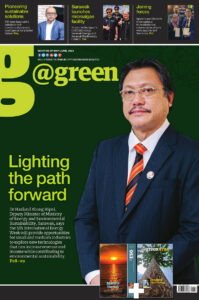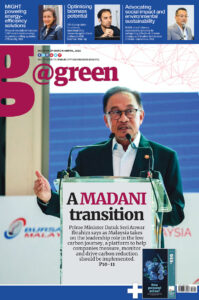Ecotourism is one of the sustainable forms of tourism that enables tourists to experience and understand the region’s nature
By Amanda Yeo
The relaxation of lockdown measures in most Malaysian States provides the tourism sector with a chance to revive from the health crisis.
However, due to the continuous closure of international borders, it is wiser for Malaysia’s tourism industry players to re-strategise their marketing strategies by focusing on ecotourism development.
According to the International Ecotourism Society, ecotourism is defined as “responsible travel to natural areas that conserves the environment and improves the well-being of local people”.
As Malaysia has vast biodiversity, it provides a spark of hope for the tourism sector to move forward, attracting visitors to experience natural wonders in the country.
In short, ecotourism is one of the sustainable forms of tourism that enables tourists to experience and understand the region’s nature and rich biodiversity. At the same time, it also generates socio-economic benefits for the remote and rural communities who are living close to natural surroundings.
The Covid-19 pandemic might have substantially restricted people’s movement to travel across borders freely, but it has given countries some breathing space to become cleaner and greener.
Assisting the tourism industry
This can be seen in Melaka, one of the famous tourist hotspots in Malaysia. Although the ongoing international travel ban had led to a drastic reduction in tourist boat traffic, it rejuvenates Sungai Melaka as a clean river after a two-month imposition of the Movement Control Order (MCO) in May 2020.
Therefore, the recent re-introduction of inter-district travel in most Malaysian states provides the government with the opportunity to strengthen ecotourism sites promotion and management. In turn, it would protect the economic livelihoods of the ecotourism operators while still stressing the importance of all Malaysians in observing SOPs.
For States such as Selangor, Kuala Lumpur, Penang, Johor, Kedah, Kelantan, Negeri Sembilan, Sarawak and Perak that fall under Conditional MCO (CMCO), tourism activities would be limited to 50 per cent of the capacity of the premises.
Among the sightseeing activities allowed include public and tourist attractions such as zoos, farms, aquariums, edutainment centres, recreational parks, extrema and nature park outlets.
On the other hand, States such as Malacca, Pahang, Terengganu, Sabah, Putrajaya and Labuan that fall under Recovery MCO (RMCO) could operate at total capacity ensuring physical distancing and temperature checks of visitors at all times.
The government’s emphasis on both lives and livelihoods would assist tourism industry players riding out of the economic storm besides minimising the human impact on the environment.
With the government’s commitment to providing job opportunities for the local and Orang Asli communities to be tour guides at all national parks under the Budget 2021, it would empower local and Orang Asli communities to educate visitors on the importance of the conservation of biodiversity and culture.
By reducing national park entry fees for nationals, the local citizens can enjoy nature, get fit, relax and release stress through jogging and hiking activities.
Among the national parks that can be explored by Malaysian citizens such as Gunung Mulu National Park in Sarawak, Taman Negara National Park in Pahang, Taman Negara Gunung Kinabalu in Sabah and Endau Rompin National Park in Johor.
Also, the government has to develop a network of tourism corridors (i.e., major overland roads, waterways, sea or air routes) that traverse the urban and rural areas of Malaysia.
Improving travel accessibility would provide convenience for travellers to visit all ecotourism sites, experiencing the essence of Malaysia’s ecotourism products and services.
Stopping fish bombing
According to the recent study done by World Wildlife Fund-Malaysia, there is an average of 65 fish bombing cases in Semporna, Sabah in 2018.
Fish bombing is illegal, unreported and unregulated (IUU) fishing where people catch fish using homemade explosives made from fertilisers mixed with kerosene and ignited with a detonator and fuse.
Not only it destroys fish habitats and provides danger implications to visitors, but it also costs lives – three divers were killed while diving near Pulau Kulapuan, Semporna, in July 2019.
To deal with the increasing number of fish bombing cases, the government needs to apply stricter monitoring and enforcement mechanisms in the surrounding islands. It will enhance safety measures among the visitors while protecting the ocean habitat.
Hence, for Malaysia to recover its tourism sector from the fallout brought about by the pandemic, the National Ecotourism Plan 2016-2025 has suggested the following proposals for the Ministry of Tourism, Arts and Culture Malaysia (MoTAC) put them into action:
• Attracting ecotourism investors by promoting and emphasising the uniqueness, strengths and development opportunities of Malaysia’s ecotourism sites;
• Introducing a protocol for ecotourism concessions that enhances the quality of the tourist experience in national parks besides ensuring sustainable financing;
• Consolidating research through the re-establishment of educational research centres in selected national parks and urban ecotourism sites through partnerships with local universities and NGOs;
• Repositioning marine protected areas in Malaysia as ecotourism destinations that champion the conservation and management of marine and terrestrial resources for the enjoyment of tourists responsibly while enhancing the well-being of the local community;
• Encouraging variants of the homestay concept by guiding providers to offer a mix of ‘live in’ homestays, annexe type homestay, kampung stay, farm stay etc. according to the needs of specific market segments;
• Marketing and promoting activity driven, eco-adventure activities to the gen Y, youth associations, school and university groups and urban families; and
• Identifying measures of ecotourism activity, including data on visitors and visitor management issues in protected areas.
To build greater environmental and cultural awareness among the visitors, the government also has to develop comprehensive insights on Malaysia ecotourism under the existing Malaysia Tourism website while establishing a national inventory of ecotourism sites within Malaysia.
By leveraging Malaysia’s vast rainforest and mangrove reserve, The National Tourism Policy 2020-2030 that was launched at the end of December 2020 could be the base to make Malaysia the Top of Mind Ecotourism Destination of the World. — @green

Amanda Yeo is Research Analyst at EMIR Research, an independent think tank focused on strategic policy recommendations based on rigorous research.







